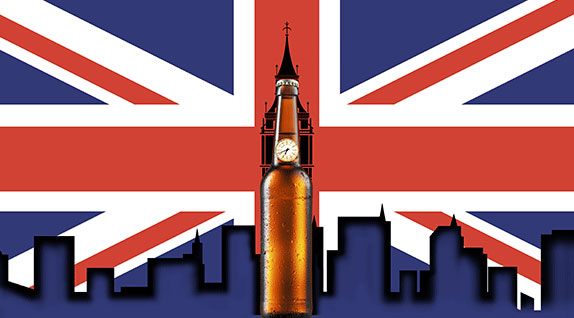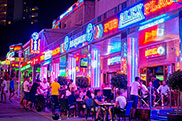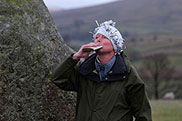 Photo Illustration: Paula C. Rondeau/The Real Truth
Photo Illustration: Paula C. Rondeau/The Real Truth
Article
The nation’s reputation as the “drunk man of Europe” precedes Britons wherever they go. The truth behind this nickname reveals a lot about the nation.
Learn the why behind the headlines.
Subscribe to the Real Truth for FREE news and analysis.
Subscribe NowThe best way to experience the over 1,900-year-old city of London is on foot. Walking allows you to see little details that would be missed by taking a red double-decker bus or the Tube, the world’s oldest subway.
A morning jaunt through the city’s narrow side streets—often draped in dense fog—provides views of rows and rows of identical Victorian-style terraced houses seemingly snatched from a Charles Dickens novel. The structures are a reminder of the nation’s leading role in the Industrial Age.
A rush-hour trek downtown to Piccadilly Circus surrounds you in a sea of commuters often clutching brollies (umbrellas, for Americans) and wearing mackintoshes and other raincoats—all prepared for Britain’s notoriously unpredictable weather.
Throughout London, both history and modernity are on display. Centuries-old buildings stand erect next to 20th-century architecture. The former survived the rigorous German bombing raids during WWII and still have markings on their walls where shrapnel grazed them.
Britons are much them same today as they were back then: a resilient people, with steely resolve when needed.
 David Ramos/Getty Images
David Ramos/Getty Images But there are many other sites to see: an afternoon stroll in The Regent’s Park reveals elegant, well-manicured gardens. An outing at the Portobello Road Market shows off the city’s global appeal, while also hearkening back to the time British colonies spanned the entire globe. A walking tour of Buckingham Palace or Big Ben and the Parliament Building demonstrate a rich history of its regal monarchy and one of the longest-running democracies in the world, respectively.
Wherever you travel throughout London, one thing is abundantly clear: Britons are an immensely capable people—both historically and today.
Yet any evidence of these positive qualities disappears at night, replaced by acts of lewdness and brash behavior. Associated Press article “Britain Bedeviled by Binge Drinking” described a typical nighttime scene: “The girls slumped in wheelchairs look barely conscious, their blond heads lolling above the plastic vomit bags tied like bibs around their necks. It’s an hour to midnight on Friday, and the two girls, who look no older than 18, are being wheeled from an ambulance to a clinic…They’re the first of many to be picked up on this night by the ambulance, known as a ‘booze bus,’ and carried to the clinic—both government services dedicated to keeping drunk people out of trouble, and out of emergency rooms.”
The article continued: “On the streets of Soho [London’s entertainment district], most people are too busy drinking to notice passed-out partyers. The streets, lined with pubs and nightclubs, are just beginning to get rowdy: Men chasing each other and shrieking like teenagers; women stumbling and falling over in their too-short skirts and high heels. Soon the sidewalks are littered with empty beer bottles and reeking puddles.”
Similar scenes regularly play out in cities across Britain. Orderly and serene by day, they are transformed into places of drunken debauchery at night.
Worse still, Britain has exported its reputation to the world. It is the “drunk man of Europe,” with public inebriation worn as a badge of honor. A visiting student from Finland noticed the stark difference from his country: “[At home] it’s embarrassing to be drunk. Here it’s kind of something you brag about” (AP).
For many who call this great nation home, such a reputation is hard to stomach. Yet Britons continue to live up to their notorious image as seen in continuous newspaper spreads, television reports, and Internet articles.
Why has such an immensely capable people turned their nation into the drunk man of Europe?
Culturally Ingrained
Leading healthcare provider Bupa reported that up to a quarter of Britons are binge drinkers, which means they quickly consume excessive amounts of alcohol to become heavily intoxicated.
Yet it is not just a problem for those who go on one-night benders or rampages—it is a blight for the entire nation. The BBC reported that close to a third of men and a fifth of women drink at least twice the recommended daily limit. Also, over 80 percent of adults do not even keep track of how much they drink when they go out. Bupa reported that an astonishing 11 million Britons—just under one in five—are tragically endangering their health in this manner.
The problem is so ingrained in society that Debrett’s, a British social etiquette organization, has an entire entry devoted to drunkenness. It states: “Despite their reputation for reticence and reserve, British people love to drink. Alcohol oils the wheels of British social life…For many people, alcohol is an effective de-inhibitor, a failsafe way of breaking down social barriers and bringing people closer together. But the [soothing] effects of alcohol can easily tip into drunkenness, as the rowdy Saturday-night streets of many British towns will testify.”
 Mario Tama/Getty Images
Mario Tama/Getty ImagesThere it is: “British people love to drink.” Overindulging is not some hidden problem, or one only among those who are younger—it affects every strata of UK culture. The detailed Debrett’s entry goes on to say that drunkenness is unattractive and gives specific details about how to handle someone who has imbibed too much.
For the nation, this is the type of protocol advice on par with the difference between “black tie” and “white tie” events and how to format your engagement announcement for the newspaper.
By comparison, the Emily Post Institute, Debrett’s American counterpart, has no similar entry on its website.
And it is not about to get any better. The Wall Street Journal reported that between 1980 and 2007, while per capita alcohol consumption in 30 Organization for Economic Co-operation and Development countries fell by 13 percent, Britain’s rose by 19 percent. The newspaper noted that average consumption in several major Western nations fell significantly during this period: 33 percent in France, 30 percent in Germany, 17 percent in the U.S., and 24 percent in Canada.
Other countries, on average do drink more than Britons, but they do not have as much of a reputation for being sloppy drunks.
How much have things changed for the UK? Alastair Campbell, who was the director of communications and strategy while Tony Blair was prime minister, recounted his experiences as a former heavy drinker in an article for ITV News: “When I had a drink problem I felt like I was in the minority going out and getting smashed night after night. In Britain today, it is the non-drinker who feels in the minority. You never have to explain why you are drinking whereas you always have to explain why you are not.”
Societal Scourge
As much of the rest of the world continues to curb their drinking, Britain stands out. It refuses to give up the bottle despite the obvious plague of problems alcohol brings the nation.
While reading the many negative effects for the UK, consider why this trend continues to worsen.
In the workplace, up to 17 million working days are lost annually because of alcohol-related sicknesses, with the cost of sick days alone to employers assessed around £1.7 billion ($2.6 billion). It has been estimated that loss of productivity to the economy from excessive use of alcohol is somewhere between a staggering £20 billion ($30 billion) and £55 billion ($83 billion) (The Independent).
The nation’s overall health is suffering also. The UK charity group Alcohol Concern said that in 2012-2013, there were over one million alcohol-related admissions to the hospital in England.
Additionally, liver disease is the only major cause of death in Britain that is rising, with deaths from cirrhosis up fivefold since 1970. In other European countries, it is significantly decreasing.
“In the last decade there has been a 63% increase in prescriptions for the treatment of alcohol dependency in England, as well as a 20% rise in deaths from liver disease,” BBC reported.
The National Health Service (NHS) and hospitals across the country are stretched to the limit in dealing with the problem.
Several years ago on the Friday before Christmas, some ambulance services received emergency calls as frequently as every 30 seconds to deal with drunk and injured revelers.
 Ian Forsyth/Getty Images
Ian Forsyth/Getty Images Booze-fueled crime and violence is another major issue. A representative from the Association of Chief Police Officers told The New York Times that “50 percent of all violent crime in Britain was alcohol-related, and that alcohol was involved in 73 percent of all domestic violence and 25 percent of child abuse cases.”
As many as 2.6 million children are living with a problem drinker, according to Alcohol Concern.
To sum up the nation’s dire situation, almost one-quarter of all Britons experience “drunk or rowdy behavior” in their communities, according to The Independent.
Descent into Drunkenness
Britons’ love of the bottle has given them a notorious reputation in Europe as drunkards. This is made clear by the constant articles addressing the subject:
- “Some Britons Too Unruly for Resorts in Europe” (The New York Times)
- “Drunk, Overweight and Sunburnt: What the Germans Think of Holidaying Britons” (The Telegraph)
- “World’s Worst Tourists? British Take the Crown Hands Down” (The Huffington Post)
The trend has gotten to the point that popular tourist spots are looking for ways to curb problems caused by “boozy Brits.”
In December 2014, Magaluf, a popular holiday resort in Spain, announced a decision to ban “pub crawls” in an attempt to restore its image to “a mature tourist zone,” British tabloid Daily Mail reported. Lawmakers were spurred to action after a shocking video emerged showing an 18-year-old UK girl performing sex acts on 24 men—in exchange for a free drink.
Magaluf is not alone. Many European cities, holiday resorts, and football stadiums are uncomfortable hosts to British visitors, having long suffered their destructive behavior.
How things have changed over the last few decades!
Not long ago, Britons were most known for being reserved and self-effacing by nature. They were a model of self-control—able to maintain a stiff upper lip even in the most difficult circumstances. The adages “keep calm and carry on” and “manners maketh the man” were regarded as sacrosanct—men or women were not considered mature unless they had a sense of decorum.
For hundreds of years, getting wasted on alcohol was not something of which to be proud—it was seen as a lack of self-control that only “ne’er-do-wells” would have. A cultured person kept his mind and reputation intact at all times.
What is behind this sudden shift? Why did the British quickly go from decent and dignified to drunk and disorderly?
The place to look is a part of UK history that most would rather forget: the British Empire.
From around 1800 until about 1950, the British had the greatest empire of all time. This historical fact drives national thinking to a much greater degree than most are aware.
As with any manmade governmental system, there were some negative aspects to the empire. But consider the many positives brought by British rule: they opened up the world to share resources, ideas and culture. In this way, they laid the groundwork for modern globalization.
In addition, they often improved the natural beauty of their colonies by planting elegant gardens. Missionaries with a sincere desire to better the world spread the King James Bible throughout the globe.
The British Empire had a meteoric rise to a truly awesome peak: it held one-fifth of the world’s landmass and ruled a quarter of mankind. Also, it controlled many of the globe’s sea gates including the Suez Canal, the Straits of Hormuz, the Cape of Good Hope, Singapore, the Straits of Gibraltar, Malta and Hong Kong.
All this in about 100 years!
Yet its downfall from this position was just as swift. Starting in earnest after World War II, the empire’s colonies were cut loose one by one until 1966, when the British Colonial Office closed its doors for good. Societal decorum has plummeted just as fast, and today continues to worsen—best seen in its alcohol epidemic.
Think. A nation rocketing to position as a global power, then an equally quick downfall. There is nothing in their history that suggests they would do so.
Or is there?
The answer lies in the world’s most widely distributed but least understood book. It is the same text British missionaries carried with them around the globe, yet never fully understood.
Yes, Britain is mentioned in the Bible—and in detail!
Vital Key
To understand where the UK is mentioned in the Bible, however, one must first understand a vital key in Scripture. Millennia ago, God made a promise to His servant Abraham because of the patriarch’s obedience. He and his descendants were foretold by God to “grow into a multitude in the midst of the earth” (Gen. 48:16).
This covenant has had a profound impact on world history. God later expounded upon it by saying that Abraham’s descendants would become both “a nation and a company of nations…” (35:10-12).
The promise was passed on to the patriarch’s great-great grandchildren Manasseh and Ephraim. Manasseh was to “become a people, and he also shall be great: but truly his younger brother [Ephraim] shall be greater than he, and his seed shall become a multitude of nations” (48:19).
In other words, Manasseh’s descendants would become a great nation and Ephraim’s a company of nations.
Looking over the annals of time, there has been only one pair of brother nations that has achieved this: America (the great nation) and Britain (the company of nations). They are the only peoples that fit the criteria.
Knowing the modern identity of Ephraim opens up crucial biblical understanding regarding Great Britain today.
In fact, God’s Word bluntly describes the condition the UK is in today: “Woe to the crown of pride, to the drunkards of Ephraim, whose glorious beauty is a fading flower, which are on the head of the fat valleys of them that are overcome with wine!” (Isa. 28:1).
With its empire gone, Britain’s “crown of pride” has become drunkenness. The “glorious beauty” of its empire is truly a “fading flower.”
Changing Times
The answer to why drunkenness is rampant in the UK is tied to the loss of the British Empire.
Recall that God promised to bless Ephraim because of Abraham’s obedience alone. The British people did nothing to deserve it. God fulfilled His end of the covenant—Great Britain became the greatest empire of all time—and now He is withdrawing those blessings to accomplish a greater purpose.
Even as it was losing its empire, Britain remained a global political, financial and cultural leader. While it should have appreciated the blessings it had, its society began to decay: The consumer society of the 1950s gave way to the sexual revolution of the 60s, which produced the “me” decade of the 70s. From the 80s until today, life has become more about acquiring possessions, having a good time, and doing “whatever makes me feel good.”
This cultural climate bred today’s “drunkards of Ephraim” attitude of widespread alcohol abuse.
The prominence afforded Britain—even without its colonies—should have been enough for it to continue as a banner of decorum and decency. Yet, by and large, it has squandered what it has been given.
Why? The UK no longer has a purpose. With its empire gone, it has lost its singular national focus. It used to take pride in spreading the cultural norms of decency, orderliness and virtue. But look at the image it has proudly exported since WWII: lewd television shows, punk rock, androgynous entertainers, a salacious tabloid culture—and, of course, drunkenness.
As Britain’s society continues to spiral downward, it reaps what it sows.
What Is Coming
Yet it did not have to be this way! God repeatedly warns modern Ephraim throughout the Bible to turn from its sinful ways. He looks down and sees alcohol abuse is rife throughout the land, which results in crime, violence, sickness, family breakdown, unhappiness and ultimately death.
The God of the Bible has a special relationship with the people of the United Kingdom: “Is Ephraim My dear son? Is he a pleasant child? For since I spoke against him, I do earnestly remember him still: therefore My bowels [the seat of emotions] are troubled for him; I will surely have mercy upon him, says the Lord” (Jer. 31:20).
God looks down and sees modern Ephraim, His “dear son,” in a sorry state: “But they also have erred through wine, and through strong drink are out of the way; the priest and the prophet have erred through strong drink, they are swallowed up of wine, they are out of the way through strong drink; they err in vision, they stumble in judgment.
“For all tables are full of vomit and filthiness, so that there is no place clean” (Isa. 28:7-8). How often does this describe a scene in modern Britain?
In order for God to have mercy on the British peoples, however, they must do what Abraham did in the Old Testament: obey God’s commands.
The UK did not have to become the drunk man of Europe—more accurately, the drunk man of the world. Throughout the 20th century, it was repeatedly warned to turn to the true God by the predecessor to this magazine, The Plain Truth. Through that publication, along with the power of television and radio, its editor-in-chief Herbert W. Armstrong showed Britain the error of its ways by relaying what God warned would happen if the nation did not repent and change.
That thundering warning fell on deaf ears, but it continues today through The Real Truth and the financial backer of this magazine, The Restored Church of God.
As a patient and merciful Being, God warns Britain twice of the direction it is going—both in the 20th century and today. And as would any loving parent, He tells Britain that it is racing headlong toward national punishment.
Jeremiah 6:15 describes coming chastisement and why it will occur: “Were they ashamed when they had committed abomination?”—think of the drunken British revelers!—“No, they were not at all ashamed, neither could they blush: therefore they shall fall among them that fall: at the time that I visit them they shall be cast down, says the Lord.”
The only way for the entire nation to avoid this time is for everyone to collectively get on their knees, repent—and live according to God’s commandments!
Given that Britons have not changed their ways despite the obvious and widespread problems of drunkenness and their materialistic lifestyles, conditions will have to get much worse before the nation as a whole wakes up. Its people will have to learn painful lessons before they will listen to God’s voice.
Yet individuals do not have to go through this if they turn to God and obey Him—including you. To do so, you must wholeheartedly follow Ezekiel 18: “Therefore I will judge you…every one according to his ways, says the Lord God. Repent, and turn yourselves from all your transgressions; so iniquity shall not be your ruin” (vs. 30).
The Bible has much more to say about both what is coming for modern Ephraim and Manasseh, as well as how individuals can heed God’s warnings now..
To learn more, read David C. Pack’s thoroughly researched and eye-opening book America and Britain in Prophecy. The information it contains can help you understand where world events are headed—and how you can change the path of your life for the better!
More on Related Topics:
- Spain Is Granting Legal Status to Potentially 500,000 Immigrants
- Bulgaria’s Government Resigns After Mass Protests
- 10 Years After the Bataclan Massacre, Paris Is Still Scarred by That Night of Terror
- French Government Collapses in 14 Hours, Deepening Political Crisis
- French Parliament Ousts Prime Minister, Deepening Political Crisis



